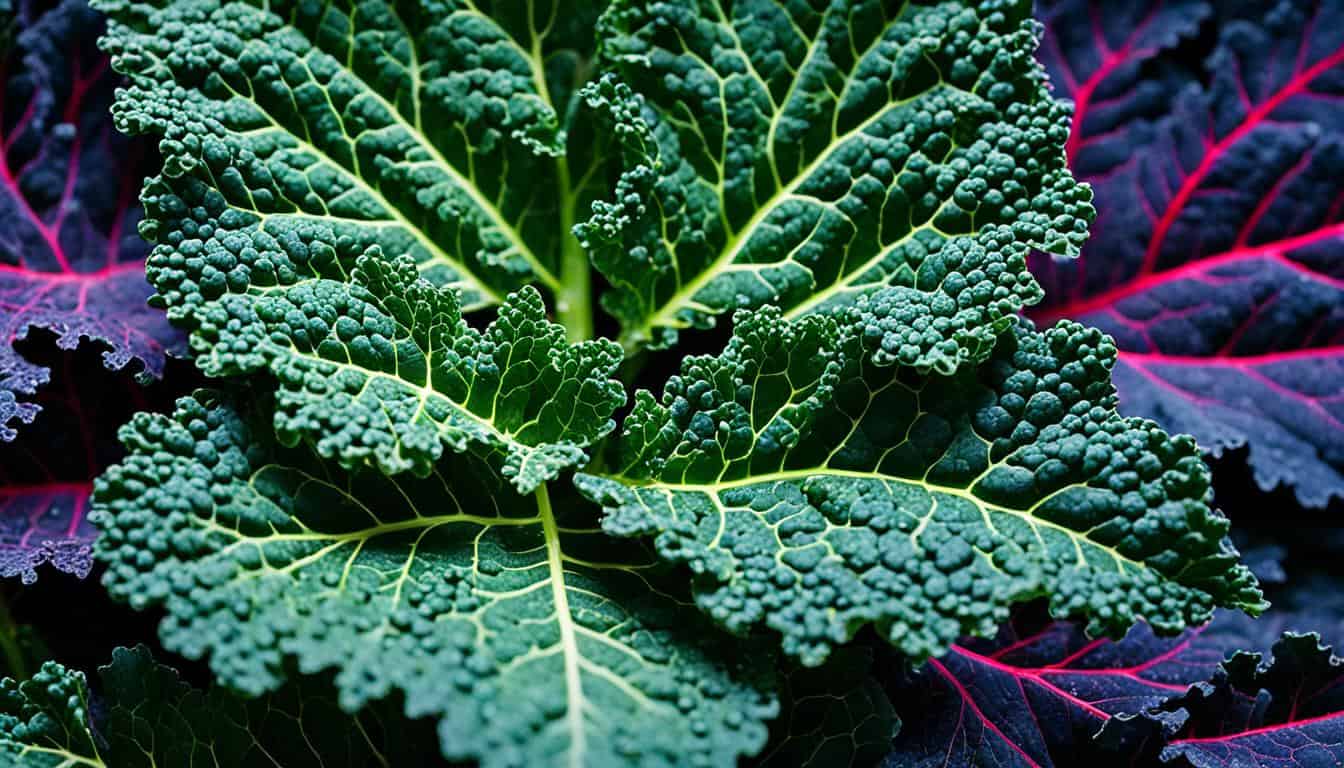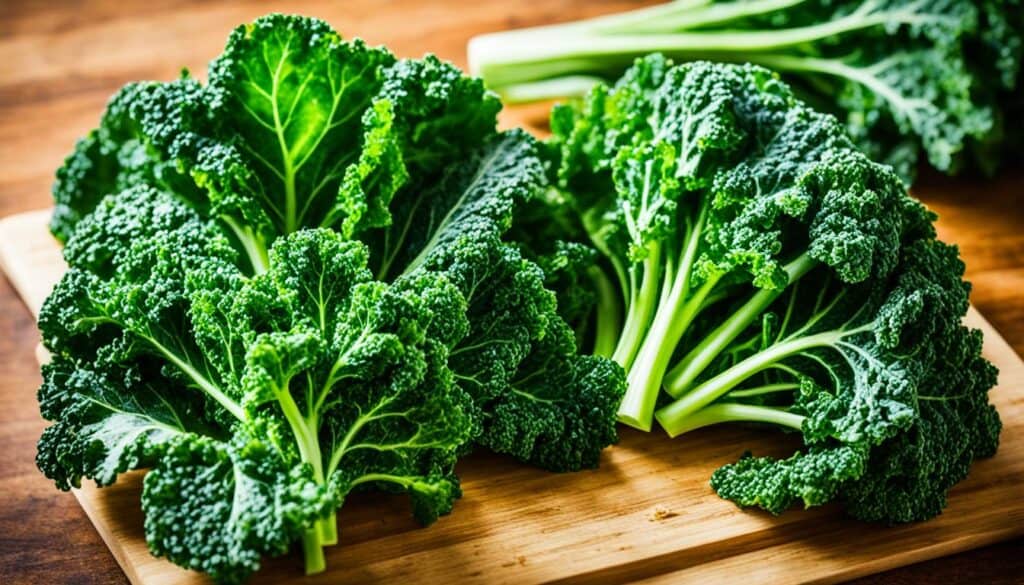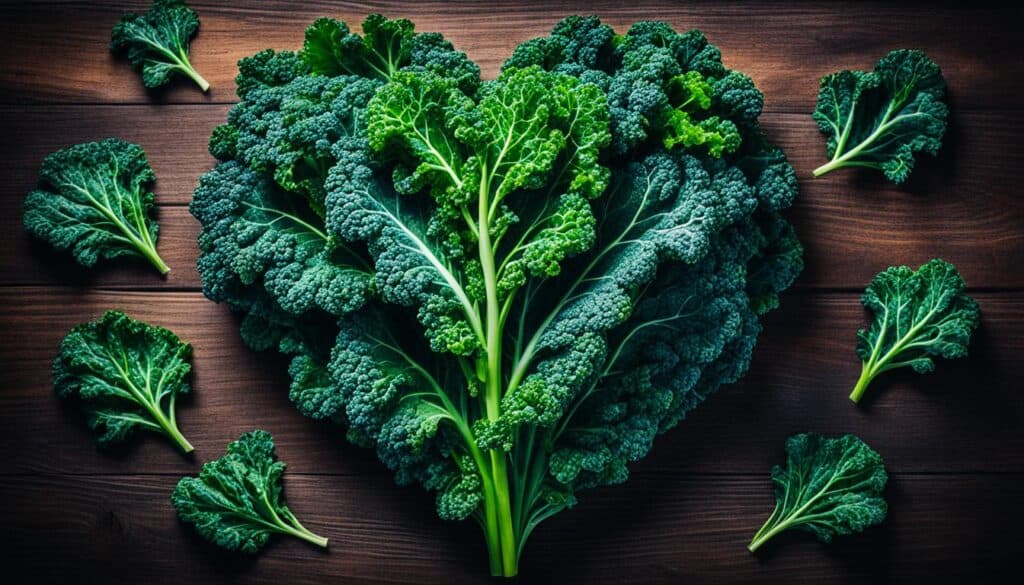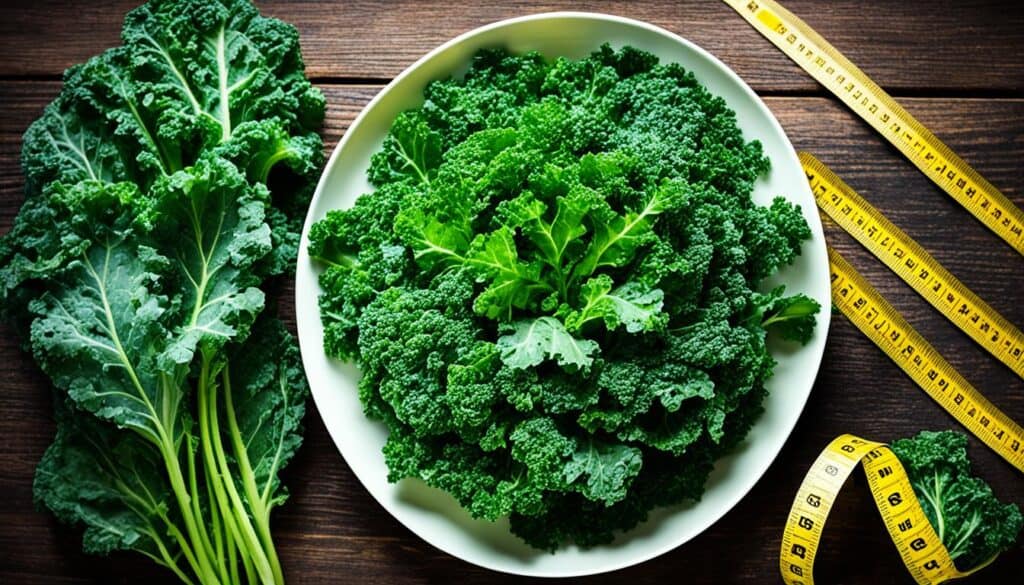https://www.youtube.com/watch?v=baDzWX4aNrU
Did you know that kale is often referred to as the “queen of greens”? This nutrient-packed vegetable has gained immense popularity in recent years, and for good reason. With its exceptional health benefits and culinary versatility, kale has become a superstar in the world of nutrition. Whether you’re a health-conscious eater or simply looking to enhance the nutritional value of your meals, kale is an excellent addition to your diet.
Key Takeaways:
- Kale is a highly nutritious leafy green vegetable rich in antioxidants, vitamins C and K, and beta-carotene.
- Adding kale to your diet can support eye health, weight management, heart health, and overall well-being.
- Kale is versatile and can be easily incorporated into a variety of recipes.
- Regular consumption of kale can help reduce the risk of chronic diseases and contribute to optimal health.
- Explore the various health benefits and cooking tips for incorporating kale into your daily meals.
9 Health Benefits of Kale
Kale, a versatile and highly nutritious vegetable, offers numerous health benefits that are supported by scientific research. This leafy green is low in calories but packed with essential vitamins and minerals, making it a fantastic addition to any diet. Here are nine compelling reasons to incorporate kale into your meals:
- Kale is a powerful source of antioxidants, assisting in counteracting oxidative damage and reducing the risk of chronic illnesses such as cancer.
- Abundant in vitamin C, kale supports collagen synthesis and boosts immune function, enhancing your body’s natural defense mechanisms.
- Kale plays a role in lowering cholesterol levels, thus promoting heart health and reducing the risk of cardiovascular diseases.
- With its impressive nutritional profile and high fiber content, kale aids in weight loss and weight management by keeping you fuller for longer periods.
- The presence of lutein and zeaxanthin in kale supports eye health by reducing the risk of age-related eye diseases, including macular degeneration.
- Kale boasts an array of vitamins and minerals, contributing to optimal bone health. Calcium and vitamin K, found in abundance in kale, are crucial for maintaining strong and healthy bones.
- Consuming kale regularly can enhance digestion due to its high fiber content, promoting a healthy gut.
- Kale is a nutrient-dense vegetable that supports overall well-being by providing essential micronutrients like manganese, potassium, and vitamin B6.
- Incorporating kale into your diet is an excellent way to diversify your meals and enjoy its unique flavor, adding variety to your culinary experiences.
With its myriad of health benefits, incorporating kale into your diet is a simple way to enhance your well-being and nourish your body. Whether you enjoy it in salads, smoothies, or cooked dishes, kale is a nutritious superfood that can make a significant difference in your overall health and lifestyle.
| Health Benefits | Description |
|---|---|
| Antioxidant Power | Counteracts oxidative damage and reduces the risk of chronic illnesses. |
| Collagen Synthesis and Immune Function | Supports collagen production and strengthens the immune system. |
| Heart Health | Lowers cholesterol levels and reduces the risk of cardiovascular diseases. |
| Weight Management | Aids in weight loss and weight management through its low calorie and high fiber content. |
| Eye Health | Reduces the risk of age-related eye diseases, such as macular degeneration. |
| Bone Health | Provides essential nutrients for maintaining strong and healthy bones. |
| Improved Digestion | Enhances digestion and promotes a healthy gut. |
| Overall Well-being | Supports overall health by providing a variety of essential micronutrients. |
| Enhances Culinary Experiences | Adds flavor and variety to your meals, making them more enjoyable. |
So why not take advantage of the numerous health benefits kale offers? Start incorporating this nutrient-packed vegetable into your diet today and experience the positive impact it can have on your well-being. Your body will thank you!
Antioxidant Properties of Kale
Kale, a nutrient powerhouse, is not only packed with essential vitamins and minerals, but it is also rich in antioxidants. These antioxidants play a crucial role in promoting our overall health and well-being. Let’s take a closer look at the antioxidant properties of kale and how they can benefit our bodies.
Kale contains a variety of antioxidants, including beta-carotene, vitamin C, flavonoids, and polyphenols. By neutralizing harmful free radicals, these antioxidants protect our cells from oxidative damage and help prevent chronic diseases.
Kale is a fantastic source of beta-carotene, an antioxidant that gets converted into vitamin A in our bodies. Vitamin A is essential for maintaining healthy skin, promoting good vision, and supporting a robust immune system.
Vitamin C, another powerful antioxidant found in kale, plays a crucial role in collagen synthesis, which helps maintain the health of our skin, bones, and blood vessels. It also strengthens our immune system and aids in wound healing.
But kale doesn’t stop there! It also contains various flavonoids and polyphenols, such as quercetin and kaempferol. These compounds have been shown to have anti-inflammatory and anti-cancer properties, further contributing to the health benefits of kale.
Kale’s Antioxidant Profile
| Antioxidant | Benefits |
|---|---|
| Beta-carotene | – Supports healthy skin and vision – Boosts the immune system |
| Vitamin C | – Promotes collagen synthesis – Strengthens the immune system – Aids in wound healing |
| Flavonoids and Polyphenols | – Exhibits anti-inflammatory properties – Shows potential anti-cancer effects |
Regular consumption of kale can provide us with a good dose of antioxidants, helping to protect our cells from damage and reduce the risk of chronic diseases. Including kale in our diet is a simple and delicious way to boost our overall health and well-being.
Nutritional Profile of Kale
Kale is a nutrient-dense vegetable that offers a wide range of vitamins and minerals. It is low in calories and carbohydrates but high in fiber. A single cup of raw kale contains significant amounts of vitamin K, vitamin C, and manganese. It also provides smaller amounts of folate, vitamin B6, potassium, magnesium, and iron. Including kale in your diet can help ensure you meet your daily nutrient needs and support overall health.
Here is a detailed breakdown of the nutritional value of kale:
| Nutrient | Amount per cup (67g) |
|---|---|
| Vitamin K | 547 micrograms (684% of the daily recommended intake) |
| Vitamin C | 53.3 milligrams (71% of the daily recommended intake) |
| Manganese | 0.54 milligrams (27% of the daily recommended intake) |
| Folate | 19 micrograms (5% of the daily recommended intake) |
| Vitamin B6 | 0.18 milligrams (9% of the daily recommended intake) |
| Potassium | 296 milligrams (8% of the daily recommended intake) |
| Magnesium | 22.8 milligrams (6% of the daily recommended intake) |
| Iron | 0.96 milligrams (5% of the daily recommended intake) |
Incorporating kale into your diet can not only provide these essential vitamins and minerals but also contribute to overall health and well-being.
Heart Health Benefits of Kale
Kale, a nutrient-rich vegetable, offers numerous benefits for heart health. Its unique combination of essential nutrients can help promote cardiovascular well-being and reduce the risk of heart disease.
Potassium: Supporting Optimal Heart Function
Kale is an excellent source of potassium, a mineral that plays a crucial role in maintaining heart health. Adequate potassium intake can help regulate blood pressure, support optimal heart function, and reduce the risk of stroke.
Fiber: Lowering Cholesterol Levels
The fiber content in kale can contribute to healthy cholesterol levels by reducing the absorption of cholesterol in the bloodstream. Including kale in your diet can help lower LDL (bad) cholesterol levels and increase HDL (good) cholesterol, promoting a healthier heart.
Folate: Protecting Against Cardiovascular Disease
Kale is rich in folate, a B-vitamin that plays a vital role in preventing cardiovascular disease. Folate helps break down homocysteine, an amino acid associated with an increased risk of heart disease. Consuming an adequate amount of folate from kale and other sources can help lower homocysteine levels and support heart health.
Calcium: Maintaining Healthy Blood Pressure
In addition to its bone-strengthening properties, calcium in kale also contributes to heart health. Calcium helps regulate blood pressure by promoting strong and healthy blood vessel function. Adequate calcium intake can contribute to lower blood pressure levels and reduce the risk of hypertension.
Antioxidants: Protecting Against Oxidative Stress
Kale’s high antioxidant content, including vitamin C and various flavonoids, helps protect the heart from oxidative stress. Antioxidants neutralize harmful free radicals in the body, reducing inflammation and preventing damage to the heart and blood vessels.
By incorporating kale into your regular diet, you can reap the heart health benefits it offers. Whether in salads, smoothies, or cooked dishes, adding kale to your meals can support a healthy heart and cardiovascular system.
| Heart Health Benefits of Kale | How It Helps |
|---|---|
| Potassium | Regulates blood pressure, supports optimal heart function |
| Fiber | Reduces cholesterol absorption, lowers LDL levels |
| Folate | Breaks down homocysteine, protects against cardiovascular disease |
| Calcium | Maintains healthy blood pressure, promotes strong blood vessels |
| Antioxidants | Protects against oxidative stress, reduces inflammation |
Eye Health Benefits of Kale
Kale, the versatile leafy green vegetable, offers numerous health benefits, including the promotion of optimal eye health. When it comes to maintaining healthy eyes, including kale in your diet can be highly beneficial. Not only is kale a rich source of essential nutrients, but it also contains specific compounds that support good eyesight and help protect against age-related eye diseases.
One of the key nutrients found in kale is vitamin A. This powerful antioxidant plays a crucial role in supporting eye health by promoting good eyesight and vision. Consuming kale regularly can provide your eyes with the necessary levels of vitamin A to maintain optimal visual function.
Kale also contains lutein and zeaxanthin, two antioxidants that are particularly beneficial for eye health. These compounds have been found to reduce the risk of various eye conditions, including macular degeneration and cataracts, which are often associated with aging. Lutein and zeaxanthin act as a natural filter, protecting the eye’s delicate tissues from harmful blue light and oxidative damage.
“Including kale in your diet can contribute to long-term eye health.”
To better understand the eye health benefits of kale, let’s take a closer look at the specific nutrients it contains:
| Nutrient | Amount per 100g |
|---|---|
| Vitamin A | 6810IU |
| Lutein | 18800µg |
| Zeaxanthin | 12100µg |
As the table shows, kale is an excellent source of vitamin A, lutein, and zeaxanthin, all of which are vital for maintaining healthy eyes.
By incorporating kale into your meals, such as salads, smoothies, or sautéed dishes, you can ensure you’re providing your eyes with the essential nutrients they need to stay healthy and function optimally.
Enhancing your diet with kale can help safeguard your long-term eye health and reduce the risk of age-related eye diseases.
Weight Management Benefits of Kale
When it comes to maintaining a healthy weight, kale is a true superhero. This leafy green vegetable is not only low in calories but also high in fiber, making it an excellent addition to any weight management diet. The combination of low calorie content and high fiber makes kale a satisfying and nutrient-dense food that can help keep you feeling full for longer periods.
Kale’s high water content and low energy density also play a significant role in weight loss. The water in kale adds volume to your meals without adding significant calories, contributing to a feeling of fullness while keeping calorie intake in check.
Moreover, kale is rich in nutrients that support overall health while promoting weight loss. Its high fiber content aids digestion and helps regulate blood sugar levels, preventing spikes and crashes that can lead to unhealthy food cravings.
Incorporating kale into your meals and snacks is a simple and effective way to support healthy weight management. Whether you enjoy it raw in salads, sautéed as a side dish, or blended into a refreshing smoothie, this versatile vegetable packs a powerful punch when it comes to helping you reach your weight goals.
The Benefits of Incorporating Kale into Your Weight Management Journey
- Low in calories: A serving of kale contains only about 33 calories, allowing you to enjoy a large portion without worrying about excessive calorie intake.
- High in fiber: Kale is a fiber-rich food that aids digestion, promotes feelings of fullness, and helps control appetite.
- Nutrient-dense: Despite its low calorie count, kale is packed with essential vitamins, minerals, and antioxidants that support overall health.
- Hydrating: With its high water content, kale helps keep you hydrated, which is essential for maintaining a healthy weight.
- Versatile: Kale can be incorporated into a variety of meals and snacks, allowing you to enjoy its weight management benefits in various delicious ways.
“Incorporating kale into your weight management routine can provide numerous health benefits beyond just shedding pounds. Its nutrient density and versatility make it an excellent addition to a balanced diet.” – Nutritionist Sarah Johnson
To get the most out of kale’s weight management benefits, aim to include it in your meals at least a few times a week. Whether you’re making a colorful salad, stirring it into a hearty soup, or enjoying it as a delicious side dish, this nutritious leafy green can support your weight management journey while delivering a range of other health benefits.
| Nutrient | Quantity per 100g |
|---|---|
| Calories | 49 |
| Protein | 4.3g |
| Fat | 0.9g |
| Carbohydrates | 8.8g |
| Fiber | 2.6g |
| Vitamin C | 120mg |
| Vitamin K | 670μg |
| Calcium | 200mg |
| Potassium | 491mg |
| Iron | 1.5mg |
Bone Health Benefits of Kale
Kale is not only a delicious addition to your meals, but it also offers numerous benefits for your bone health. This leafy green vegetable is rich in two essential nutrients that are crucial for maintaining strong and healthy bones: calcium and vitamin K.
Calcium is well-known for its role in supporting bone health. It is the main mineral found in bones and teeth, and it plays a vital role in maintaining their structure and strength. Adequate calcium intake is essential to prevent bone loss and reduce the risk of conditions like osteoporosis.
Vitamin K also plays a crucial role in bone health. It is responsible for regulating calcium metabolism and ensuring the proper mineralization of bones. Inadequate vitamin K levels can lead to poor bone mineral density and an increased risk of fractures.
By including kale in your diet, you can naturally boost your calcium and vitamin K intake and support optimal bone health. Not only does kale provide these bone-building nutrients, but it is also low in calories and packed with other essential vitamins and minerals.
Adding kale to your meals can be as simple as tossing it into salads, sautéing it as a side dish, or blending it into smoothies. Its versatility makes it easy to incorporate into your daily diet and reap the bone health benefits it offers.
So why not start enjoying the delicious taste of kale while giving your bones the support they need?
Conclusion
Incorporating kale into your diet is a simple and effective way to boost your overall health and well-being. This versatile vegetable is not only packed with essential vitamins, minerals, and antioxidants, but it also offers a range of health benefits that can support your body in numerous ways.
Whether you prefer kale in salads, smoothies, or cooked dishes, this nutrient-dense vegetable can easily be incorporated into your daily meals. Its impressive nutritional profile, including high levels of vitamins C and K, as well as beta-carotene, makes it a superfood that should have a permanent place in your kitchen.
Not only does kale provide a wide range of health benefits, from promoting heart health and supporting weight management to improving bone health and boosting eye health, but it also adds a delicious flavor and vibrant color to your dishes. So why not explore the diverse ways you can cook with kale and enjoy its benefits while savoring every bite?










Leave a Reply